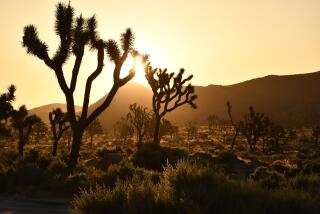‘I never did find out why he hated us . . . he hated Indians, I guess.’
- Share via
Josephine Cote learned to swim in the creek near her mother’s log cabin. She worked in a factory during the war and drove a stock car in a derby in Detroit. Now, at 70, she is retired in North Hollywood and is busy driving senior citizens on shopping trips and to doctors’ appointments.
I grew up on the Oneida Indian reservation near Green Bay, Wis. A lot of the white farmers moved into the area and bought up the Indians’ land. My father had 25 acres that he hung on to. We lived on his land in a log house, which my mother kept adding on to. We wound up with a two-bedroom house.
My mother was a Mohawk, and my father was an Oneida. She was born on a reservation in New York but was adopted quite young by Quakers and didn’t know any Indians until she grew up. Her adopted father was a doctor in Philadelphia. His name was Dr. Joshua Allen. He educated her and wanted her to become a doctor. Apparently she was a good student and became a pretty good doctor. She was an intern in Philadelphia when she met my father. He went to Carlisle. He was studying farming because he had this 25 acres that he wanted to farm. He asked her to move to Wisconsin with him.
She had six children, and my twin and I were the youngest. We were 5 months old when my father died of a ruptured appendix and peritonitis. My mother had six children to raise. She had a lot of people coming to her for help, and she learned a lot from the Indians. But she didn’t have a Wisconsin license. So she never charged for her services.
She would get a bushel of potatoes or whatever the party had. One guy gave her a washtub full of strawberries. When people would butcher, they would give some of the meat and whatever they had, or they’d trade off services. A woodcutter would stack up wood for her, because we all burned wood at that time. There was no electricity, no plumbing. It was pretty rural living, primitive almost.
I first attended a Catholic school, and then later I went to a public school. On the way to school I used to cut through the woods and fields, and I’d carry a .22 rifle to shoot game to help feed the family--rabbits, squirrels and pheasants. Nobody thought anything of that. When I tell people that today, they think it’s remarkable to take a gun to school. I just put it in the cloak room. Nobody touched it. They respected your possessions in those days. The public school had eight grades in one room. There were four or five people in each grade and one teacher.
I went to West Green Bay High School for two years. Then I went to Haskell Indian School in Lawrence, Kan. There was so much prejudice in Green Bay, I hated going to school there. We would walk down the street to the library, and there was one man who would ride by us on a bike and curse us and swear at us, and we hadn’t done anything. Why did he hate us so much? I never did find out why he hated us. It’s just that he hated Indians, I guess. There were a lot of people like that. Of course they didn’t ride by on bikes, but you could feel the resentment.
On our reservation today most of the younger people are trying to bring back more of the traditions that were originally beat out of us when I was a kid. At recess some of the Indian kids would be talking to each other in their native tongue, and the sisters would come up and tell them they had to speak English. They would punish them by making them write, “I will speak English” on the blackboard so many times. The Indian children used to like to wrestle. That was sort of like a sport. They were discouraged from doing that, because, I think, the sisters thought they were fighting, and they really weren’t, just like a lot of games they would play. The sisters would try to get them to do things the civilized way. That work began to get on my nerves. To me, as a youngster, to be civilized meant loss of freedom.
More to Read
Sign up for Essential California
The most important California stories and recommendations in your inbox every morning.
You may occasionally receive promotional content from the Los Angeles Times.













